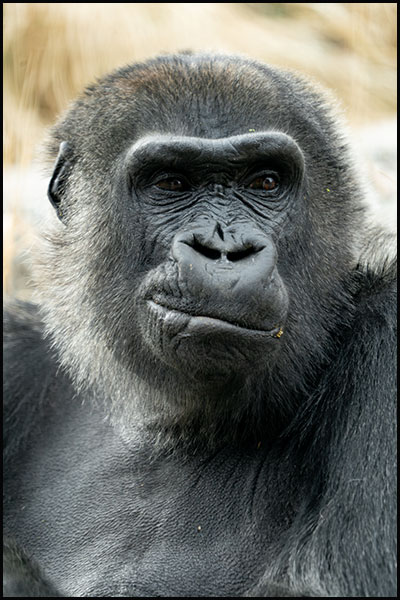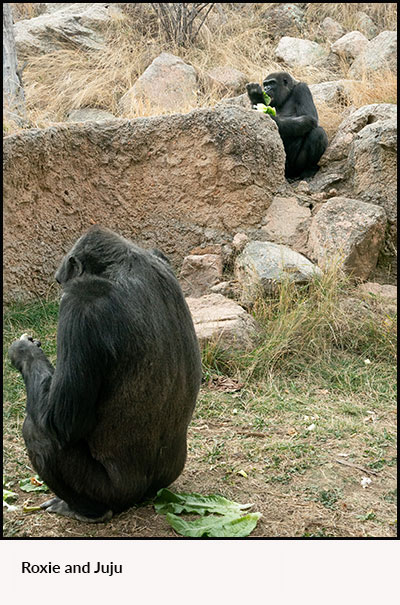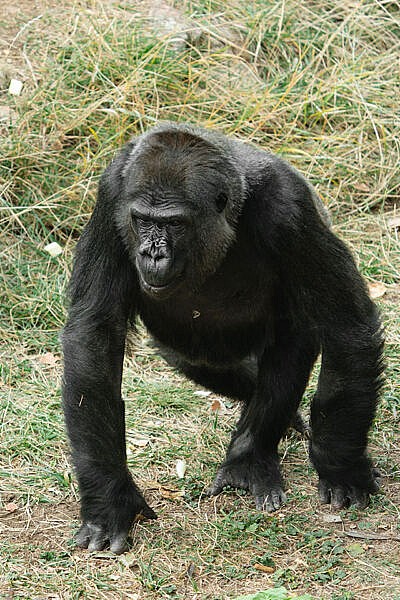Juju, a 43-year-old female Western lowland gorilla, is adjusting to a new care plan after a health scare at the end of October 2023. She has experienced phases of discomfort that her team supported her through in the past. But, this time, she seemed to have less specifically-located pains and more general discomfort.

After a few days of what appeared to be headaches, lethargy, reduced appetite and behavioral changes, like choosing to spend time alone in her den rather than with the group, Juju’s care team decided they could best help her with an immobilization.
“Gorillas are incredibly intelligent,” said Joanna Husby, animal care manager in Primate World. “Juju knows that when we have immobilized her to address health concerns in the past, we have first asked her to go into her den and take a voluntary injection to begin anesthesia. This time, without us asking, she chose to go into her den and started presenting her voluntary injection behavior, putting her shoulder up against the mesh toward us. I think she understands that the injection would be the first step towards us helping her feel better, so it’s like she was communicating that she wanted our help.”
During the immobilization, Juju received IV fluids while the team did an ultrasound, took x-rays, drew blood and collected urine for diagnostics. Sadly, those results revealed that Juju is in late stage kidney disease. It appears to have progressed rapidly, as it was not evident in her previous tests only two years earlier. The disease is unfortunately not reversible, so the team is now focused on preventing it from getting worse while keeping her comfortable.
To achieve that, her team needs to manage her blood pressure and reduce or eliminate medications that can cause kidney damage. The medications that need to be adjusted are also the medications that have kept her physical pain at bay. So, in addition to finding a blood pressure medication that she can tolerate, the team needs to find new ways to manage any discomfort.
Juju’s team has changed her pain medications or their dosages started an oral blood pressure medication, and she seems to be improving. Over time, the team hopes that she will be willing to train for voluntary blood pressure checks and voluntary blood draws, so they can monitor her kidney blood values without the need to immobilize to get that information.

“We’re seeing subtle improvements in Juju,” said Husby. “She’s spending time with the troop, eating and drinking normally and appears to be more stable when moving around. We recognize we can’t put a gorilla on dialysis, which is what a human with this stage of kidney disease would likely be encouraged to do, so our treatment options are somewhat limited, but they seem to be helping.”
The median life expectancy of a female Western lowland gorilla in human care is 39 years, according to the Association of Zoos and Aquariums. With that in mind, Juju’s care team is working to give her as many good days as possible, while balancing the risks and benefits of future immobilizations. Putting an animal under anesthesia is always risky, but if the team sees Juju decline in a way they believe they can help under anesthesia, another immobilization is not out of the question.
Juju’s team tracks quality-of-life markers that help them identify if and when they need to escalate her care, including her appetite, activity level, social interactions with other gorillas, mobility and interest in training and enrichment.
“She’s interacting well with the troop and participating in voluntary behaviors, like EKG readings that help us monitor her heart, which can also be impacted by high blood pressure,” said Husby. “We’re cautiously optimistic about the progress she has made over the past couple of weeks, and she has an excellent team of humans and gorillas surrounding her with care and camaraderie.”
Roxie – a 47-year-old female gorilla who Juju has the closest relationship with – has been staying close by, and was especially attentive before Juju’s immobilization.
“We’re going to make the best decisions for her and the social dynamic of the troop as a whole,” said Husby. “We know them all so well that we can make changes quickly to address Juju’s health and the troop’s well-being. She could decline rapidly or we could be lucky and have her with us for many more years. We’re holding onto hope for the latter.”

